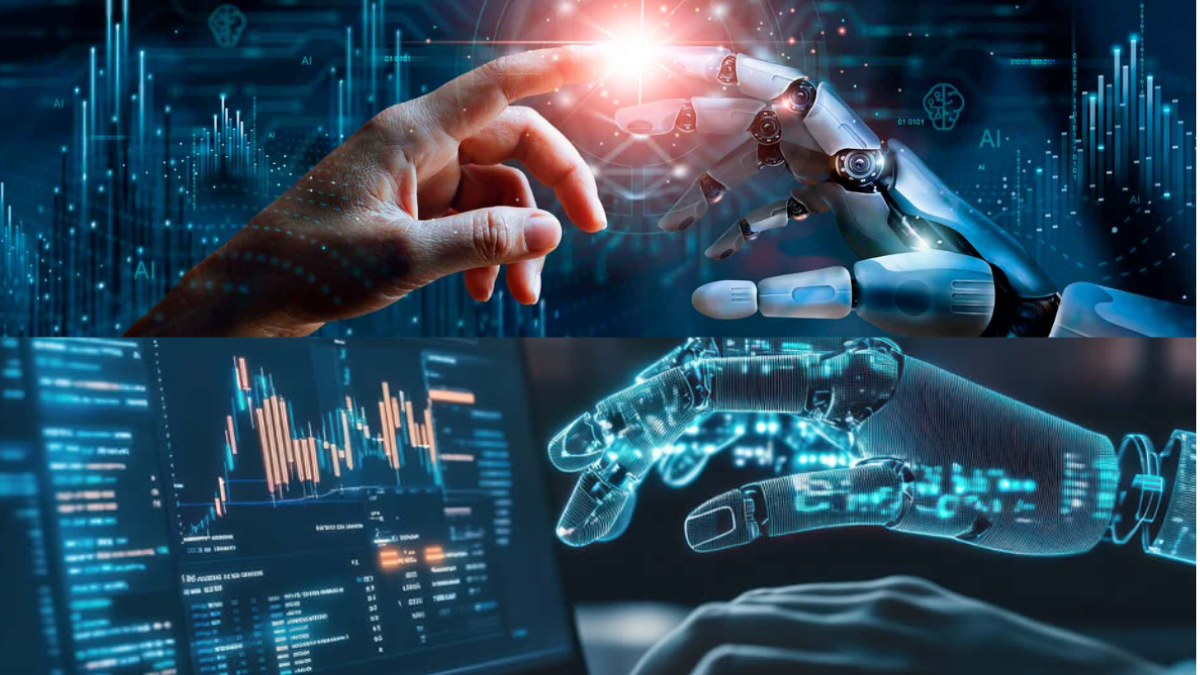Table of Contents
How will Ai change the Future of Work? The future of work is rapidly evolving, thanks to advancements in artificial intelligence (AI). AI is no longer just a futuristic concept; it is changing how we work today. From automating routine tasks to creating new types of jobs, AI is reshaping the workforce. But how will AI change the future of work, and what does this mean for workers and industries? Let’s explore how AI, particularly generative AI, is having a massive impact on the world of work.
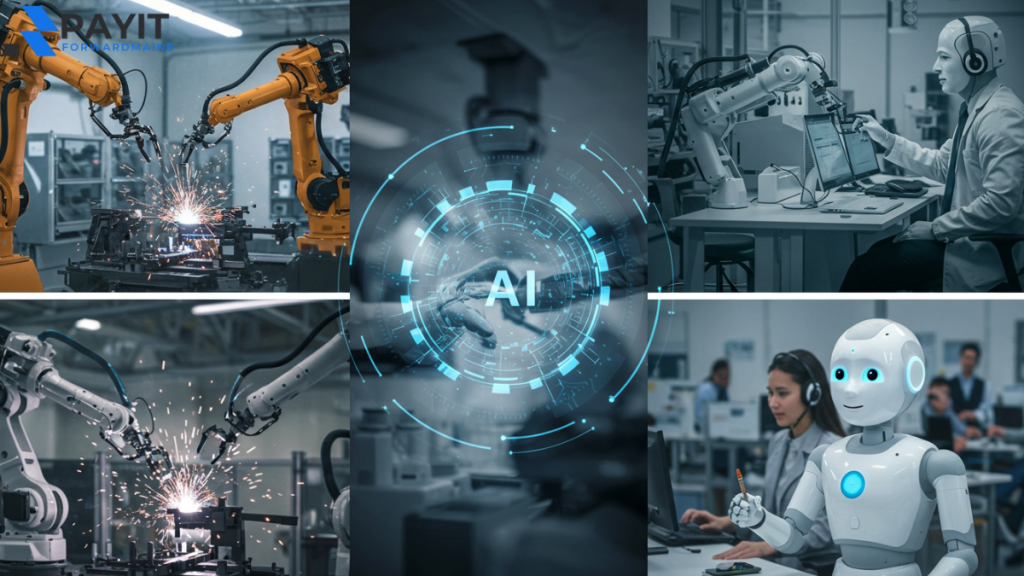
What is AI, and how will Ai change the future of work?
Artificial Intelligence, or AI, is the ability of machines to do tasks that usually need human intelligence. These tasks include learning, problem-solving, and decision-making. AI can change work by automating mundane tasks. It can make processes more efficient and enhance human abilities.
Generative AI, a subset of AI, goes a step further. It creates new content, such as text, images, and even music, by learning patterns from existing data. This ability to generate new material will play a key role in how businesses and workers interact with technology in the future.
Check out this article: Can you hookup a generator to a Tesla Powerwall 2?
The Rise of Automation: How AI Is Revolutionizing Work
One of the biggest impacts of AI on the future of work is automation. AI tools are designed to take over repetitive tasks that were traditionally done by humans. How will Ai change the Future of Work? This includes work like data entry, scheduling, and customer service. AI-powered systems, like chatbots, are helping businesses. They handle inquiries and issues more efficiently.
Automation has many benefits. It helps companies save time, reduce costs, and improve accuracy. For example, in manufacturing, AI robots can do repetitive tasks. They don’t make errors, so productivity increases. In healthcare, AI is already assisting with surgeries, improving precision and speed.
How will Ai change the Future of Work? Although AI can automate many tasks, it is not meant to replace all human work. Instead, it will transform work, allowing humans to focus on more creative and strategic tasks. AI, by automating the routine, frees up workers’ time. They can then focus on problem-solving, customer relations, and other high-level tasks.
Job Loss or Job Transformation? Understanding AI’s Impact on Jobs
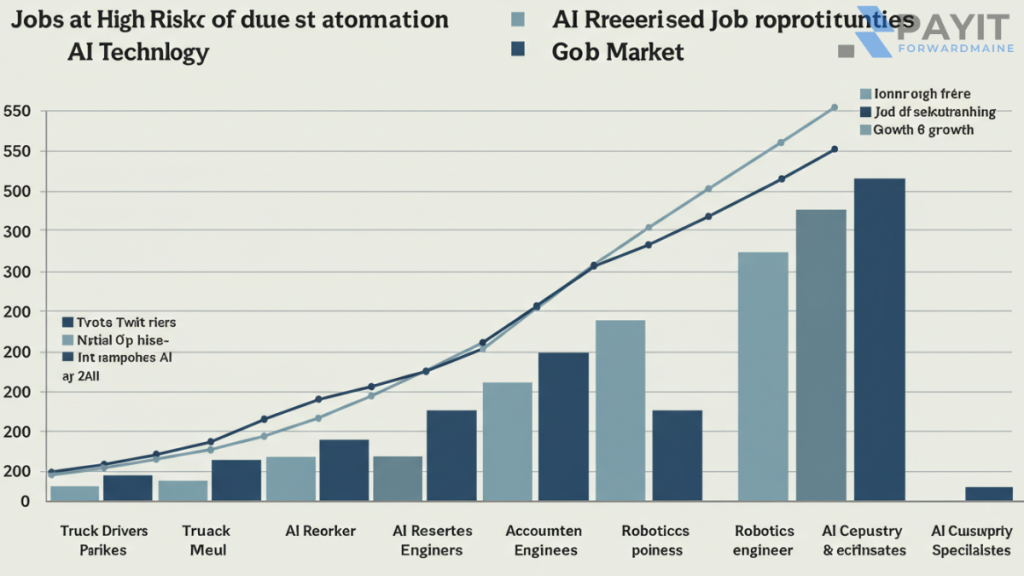
One of the most talked-about concerns regarding AI is its potential to replace jobs. It’s true that AI could displace workers in certain roles, especially in areas that involve repetitive tasks. How will Ai change the Future of Work? Jobs like customer service, data entry, and even some forms of administrative work are at risk of being automated by AI.
However, while AI may replace some jobs, it also creates new opportunities. As businesses adopt AI technologies, there will be a demand for workers in AI-related fields. Jobs in AI development, maintenance, and oversight will grow. People will need to design, program, and monitor AI systems to ensure they work effectively.
How will Ai change the Future of Work? Furthermore, AI will transform existing jobs. Rather than replacing workers, AI will augment their abilities. For example, in the medical field, AI is already assisting doctors with diagnosing diseases by analyzing large amounts of data. While the AI performs the data analysis, doctors can focus on the human aspect of patient care.
Generative AI: A New Frontier in Creativity and Productivity
How will Ai change the Future of Work? Generative AI is an exciting development in the world of artificial intelligence. It can create new content, like text, images, and videos, from patterns it learns in existing data. This has huge implications for creative industries like marketing, advertising, and entertainment.
For example, generative AI tools like ChatGPT are revolutionizing content creation. These AI systems can quickly and efficiently generate written content. They help businesses produce articles, blog posts, and marketing materials. So, workers in creative fields can refine ideas and strategies. AI will handle the initial content creation.
Generative AI is likely to play a central role in the future of work, especially in industries that rely on creativity. It will let companies create content at scale. This will give workers a chance to find new solutions. How will Ai change the Future of Work? However, AI cannot replace the human touch in tasks that require empathy, creativity, and ethical judgment.
Check out this info: How will Ai change the Future of work.
AI and the Future of Jobs: New Roles and Skill Development
As AI transforms the workforce, new jobs will emerge. The AI revolution will create millions of new roles in fields like AI development, data science, and machine learning. These jobs will require new skills, such as programming, data analysis, and AI management.
How will Ai change the Future of Work? To succeed in the AI-driven future of work, employees will need to develop AI skills. For job security, it is vital to learn AI tools, understand machine learning, and stay updated on AI. As AI technologies become more common in businesses, workers must prioritize AI training.
Companies can help their employees by offering training and upskilling opportunities. For example, businesses can teach workers to use AI systems. This will boost their productivity and job satisfaction. Embracing AI and learning will keep workers relevant in a fast-changing job market.
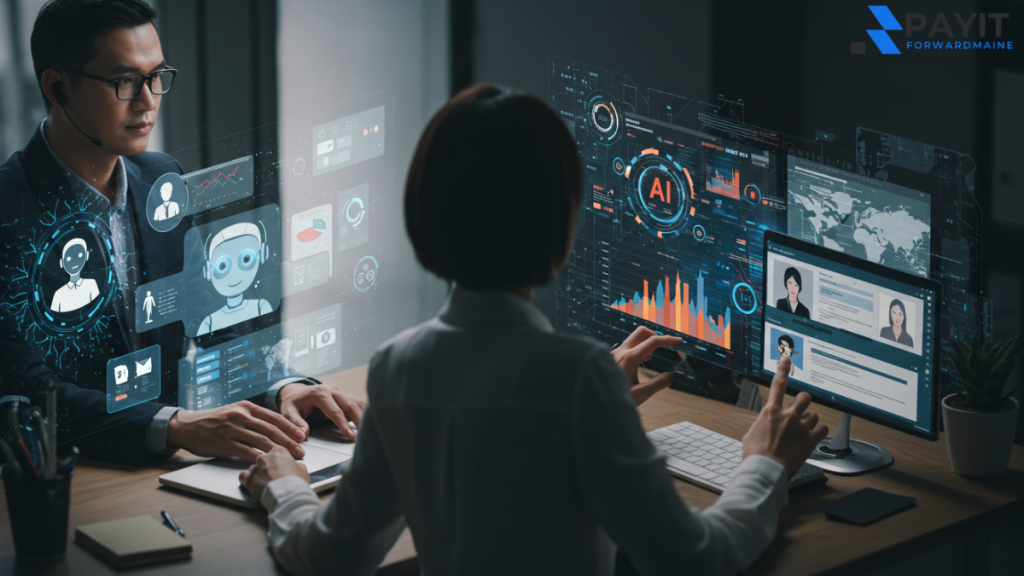
The Impact of AI on Productivity and Decision-Making
AI’s impact on productivity is undeniable. By automating routine tasks, AI allows workers to focus on higher-value activities. For example, AI can help businesses analyze data faster and more accurately than humans. It speeds up decision-making. It provides insights that would take much longer to gather manually.
AI tools can also improve customer service. AI-powered virtual assistants and chatbots are now standard in many industries. They help customers get quick, efficient answers. These AI systems can handle a wide range of inquiries. They can answer simple questions and tackle complex issues. This improves customer experience and operational efficiency.
The Future of AI: What’s Next for the Workforce?
How will Ai change the Future of Work? As AI continues to evolve, its impact on the future of work will only increase. The potential for AI to transform industries and create new jobs is vast. But we must also consider the challenges of this change. These include job loss and the need for workers to adapt to new technologies.
The World Economic Forum predicts that AI will lead to the creation of millions of jobs in the coming years. These roles will focus on the development, maintenance, and oversight of AI systems. Also, AI will create new opportunities in healthcare, education, and finance. How will Ai change the Future of Work? It can help with data analysis, decision-making, and personalization.
AI will also continue to evolve in the coming years. Generative AI is making waves in content creation. Future AI advances could have an even bigger impact. AI could help design sustainable business models. It could improve education and help tackle global issues, like climate change.
Ethical Considerations: Data Privacy and Security
As AI becomes more integrated into workplaces, concerns about data privacy and security are growing. AI systems require large amounts of data to function effectively, and ensuring that this data is used ethically is a priority. Organizations must adhere to data protection regulations and ensure transparency in how they use AI.
How will Ai change the Future of Work? AI also brings challenges related to job loss and income inequality. While AI creates new roles, it also has the potential to displace workers in traditional jobs. Policymakers, businesses, and workers must work together. They need to ensure AI adoption benefits everyone. Additionally, workers must receive support through training, reskilling, and career transitions.
Will robots steal my job?
How will Ai change the Future of Work? As we ponder whether robots will take our jobs, we must grasp the link between generative AI and the future of work. AI’s impact on the job market is profound. Estimates suggest that generative AI could replace millions of jobs in various sectors. However, rather than complete displacement, many jobs may evolve as we integrate AI into our workflows. For example, generative AI’s research layer could boost human productivity. It can automate routine tasks, freeing workers to tackle complex challenges.
With the rise of AI, many organizations are exploring new applications. They want to see how AI can boost efficiency and creativity. AI models may threaten some jobs. But they also create good jobs that need human oversight and innovation. How will Ai change the Future of Work? AI and machine learning will affect job availability. The shift from hype to reality suggests that, in the future, humans will likely collaborate with AI in the workplace rather than be replaced.
The Benefits of AI and Automation in the Workforce
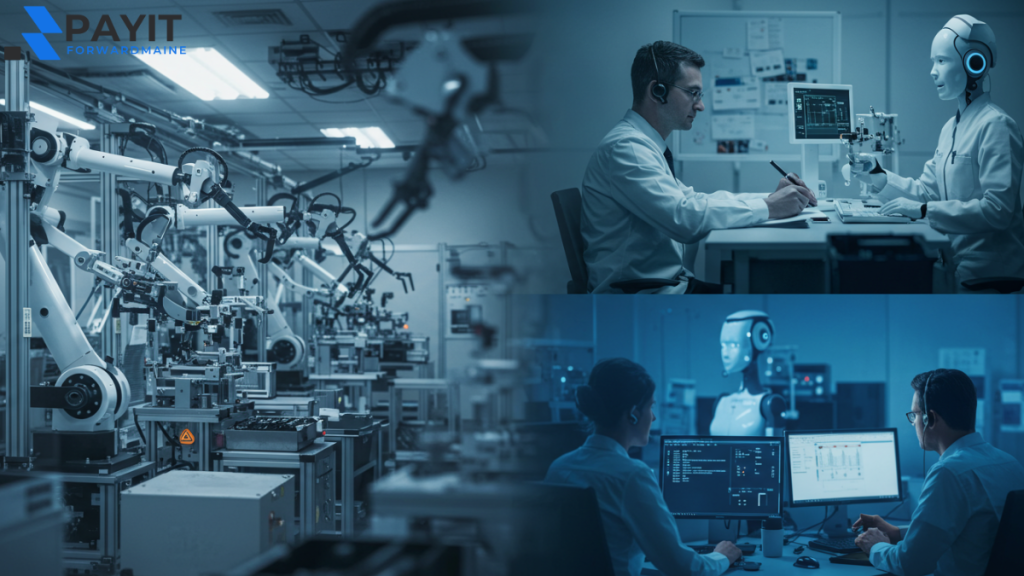
How will Ai change the Future of Work? AI and automation are changing the workforce. They offer businesses and employees new ways to boost efficiency, cut costs, and raise productivity. These once-distant technologies now transform industries and how people work. This article will explore the benefits of AI and automation in the workforce. They can improve employee experiences and business results.
1. Increased efficiency and productivity
One of the most significant benefits of AI and automation in the workforce is the increase in efficiency and productivity. AI-powered systems can perform repetitive tasks faster and more accurately than humans. For example, automation tools can handle data entry, inventory management, and scheduling. They can also do some customer service tasks. They need no breaks or downtime. This lets employees focus on strategic, creative, or social tasks. These require human judgment and expertise.
In manufacturing, automation systems can manage the entire production line. They can assemble and package products. This work is done in a fraction of the time it would take humans. This not only speeds up the production process but also helps companies meet customer demands more effectively.
2. Cost Savings for Businesses
AI and automation can lead to significant cost savings for businesses. By using machines and AI, companies can cut costs. This is true in areas like labor and human error. For example, automating routine tasks can cut staffing costs. Tasks like data processing and inventory management no longer need multiple employees.
Also, AI systems can run 24/7. This cuts overtime and ensures work during off-hours. This constant work boosts output with fewer resources. It lets companies streamline operations and optimize resources for peak efficiency.
3. Improved Decision-Making and Data Analysis
AI’s ability to process and analyze vast amounts of data can significantly enhance decision-making within a business. AI models can quickly find patterns and trends in large datasets. They provide insights for executives and managers to make data-driven decisions. AI helps businesses stay ahead of the competition. It identifies new market opportunities, improves products, and optimizes customer service.
In retail, AI can analyze customer buying habits and preferences. It lets companies create personalized recommendations and campaigns. They will better resonate with their audience. AI can help doctors in healthcare. It can analyze medical data. Then, it can suggest better diagnoses and treatments.
4. Enhanced Customer Service
AI chatbots and virtual assistants are being used more to improve customer service. They provide quick answers to inquiries and resolve issues efficiently. These AI systems can handle many customer queries. They can check order status and provide tech support. This reduces wait times and improves the customer experience.
Automation can free up human agents. They can then focus on complex customer needs. These require empathy, creativity, and problem-solving skills. This mix of AI and human interaction ensures top service. It provides quick answers to simple questions and tailored help for complex issues.
5. Job Transformation and New Opportunities
AI and automation may replace some jobs. But they will create new ones, too. This is especially true in AI development, maintenance, and oversight. As businesses adopt AI, demand will grow for workers who can design, program, and maintain these systems. This includes roles in AI programming, data science, robotics engineering, and AI system oversight.
Also, AI can change jobs by automating routine tasks. This lets employees focus on more valuable work. For example, accountants may use AI to auto-categorize transactions. This would free up time to analyze financial trends and advise businesses. AI can help healthcare professionals diagnose diseases. This lets them spend more time with patients and provide personalized care.
6. Improved Workplace Safety
AI and automation are also making workplaces safer. In construction, mining, and manufacturing, robots and AI can take over dangerous tasks. This reduces the risk of workplace injuries and deaths. AI systems can monitor real-time conditions and alert workers to hazards. This ensures that safety protocols are followed and prevents accidents.
For example, AI can operate machines in hazardous environments. It can also conduct inspections. It keeps workers safe from dangerous chemicals, high heat, and heavy machinery. It protects employees. It also helps businesses cut costs from injuries and downtime.
7. Personalized Employee Development
AI technologies can also enhance employee development by offering personalized learning experiences. AI can help businesses. It can analyze employees’ skills, performance, and learning styles. Then, it can create customized training programs to meet individual needs. AI platforms can find knowledge gaps. They recommend courses to help employees develop new skills, keep up with trends, and advance their careers.
For example, AI can help tech employees stay up to date with new programming languages and technologies. It can also give managers insights into employee training progress. This lets them support employees and ensure they meet their goals.
8. Scaling operations with minimal effort
AI and automation can help businesses expand. They can lower the challenges of scaling operations. Traditional methods of scaling often require hiring additional staff, training, and expanding infrastructure. However, with AI, businesses can scale more efficiently by automating processes that were once manual. This means companies can handle larger volumes of work without the need for proportional increases in resources.
E-commerce platforms can use AI to meet high customer demand. It can automate order processing, inventory management, and customer service. This lets businesses grow quickly without a large workforce. So, AI is vital for companies wanting to expand quickly and efficiently.
9. Better Use of Human Talent
AI and automation are not here to replace human workers but to complement them. AI takes over repetitive tasks. This lets humans focus on creative, emotional, and strategic work. This shift in responsibility makes work more fulfilling for employees. They are freed from mundane tasks and can use their talents in more impactful ways.
For example, marketing pros can use AI tools to analyze data and automate email campaigns. They can then focus on creating strategies and engaging content. Similarly, doctors and nurses can use AI tools to aid in medical decisions. But they still provide the vital human care that patients need.
Embracing AI for a Better Future of Work
AI has the potential to change the future of work in profound ways. From automating routine tasks to creating new job opportunities, AI is reshaping the workforce. Generative AI and automation tools are changing industries. They boost productivity, improve decision-making, and enhance creativity.
How will Ai change the Future of Work? However, it’s important to remember that AI is not a replacement for human workers. Instead, it is a tool that can enhance human abilities. It lets workers focus on more strategic, creative, and social tasks. By embracing AI and developing the right skills, workers can thrive in this new, AI-powered world of work.
The future of AI presents exciting possibilities for both businesses and workers. Let’s work together. By prioritizing AI, we can benefit the workforce and create a brighter future for all.

